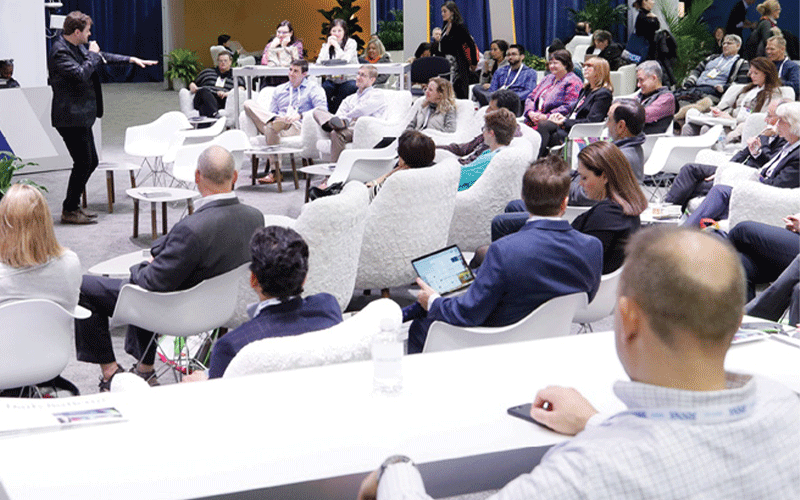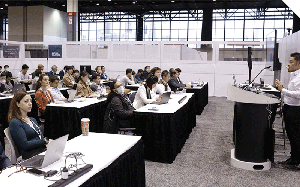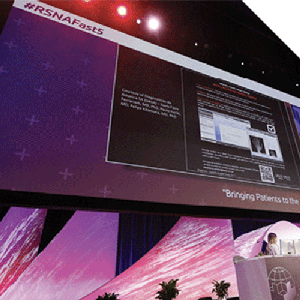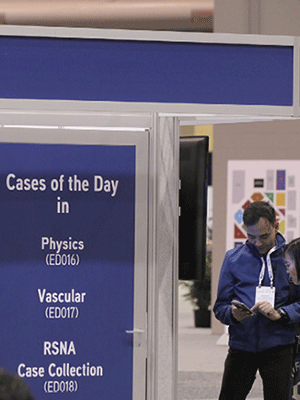RSNA 2023 Science and Education Highlights
Attendees can select from variety of education and science highlights to add to their meeting agenda

RSNA 2023 offers 300+ educational courses and scientific sessions covering every subspecialty in a variety of formats across all career levels. Here is a sampling of session highlights and education and science courses attendees might want to include in their meeting agenda for the week.
Adding Virtual Access to your registration guarantees that you can attend the meeting at your pace and your convenience, with more than 300 livestreamed and on-demand courses to meet the needs of global attendees. Attendees who register for Virtual Access will be able to view 100% of all available annual meeting programming until April 30, 2024, at noon CT.
SCIENCE SESSIONS
Each one-hour science session includes a series of 7-minute presentations of hypothesis-driven research focused on a common theme. Science sessions cover every subspecialty and modality. Science sessions with keynote include an introduction and/or conclusion to the topic by an invited lecturer.
EDUCATIONAL COURSES
Invited faculty teach courses across all subspecialties in sessions that last one to two hours. Presentations take on several different formats including hands-on, case-based, essentials, hot topic and interactive sessions. Browse the online program and filter by subspecialty and content format to find the course that fits your needs.
Case-based courses offer case scenarios to demonstrate best practices and include self-assessment for participants to test their knowledge. Consider these courses:
• Lung/Mediastinum Case Based Multidisciplinary Review
• Demystifying Postoperative Spine Imaging: Imaging Techniques and Case Based Review
• Critical Musculoskeletal Trauma in the ER- A Case Based Approach
Essentials courses are designed for the general radiologist, trainees and subspecialty radiologists who want to review other areas of focus. Faculty focus on the fundamentals of the given topic. Consider these courses:
• Musculoskeletal Imaging: When Molecular Imaging Helps
• Essentials of GI Imaging
• Revolution in Alzheimer’s Disease Therapy is Finally Here: What does the Radiologist Need to Know
Hot topics courses highlight late-breaking research and new innovations in radiology and offer a variety of viewpoints on a topic. Consider these courses:
• Informatics and Patient Centered Care-Creating the Tools For a Better Radiology Experience
• Hot Topics in Emergency Radiology
• The Future is Here: Artificial Intelligence in Cardiovascular Imaging
Interactive sessions invite audience participation using technology including polling, self-assessment or gamification. Consider these sessions:
• STAT! Emergency Imaging of the Pediatric Patient
• Multi-modality Challenging Breast Cases
• GU Essentials! A Case-Based Audience Participation Session

RSNA LABS
RSNA Hands-On Labs are six 90-minute sessions where you can learn about and practice a variety of imaging and interventional protocols across several modalities and various body structures.
Practice techniques in the RSNA Hands-on Labs with hands-on training courses focused on Pediatric Musculoskeletal US; Liver Elastrography; Musculoskeletal US: Approach to Ultrasound Assessment of the Shoulder with Dynamic Maneuvers; Ultrasound Doppler Hands-On Course of the Carotid System and Abdominal Vasculature; Breast US Biopsy; and Contrast Reaction Management.
Build AI acumen in the RSNA Deep Learning Lab, located in the Learning Center. The Lab features 19 unique sessions covering a range of topics and skills. Bring your own devices for hands-on activities and to explore new tools and resources.
RSNA AI Deep Learning Lab sessions are available in several skill levels including beginner-friendly options. See topics and schedules at Meeting.RSNA.org and add labs to your registration; labs are $100 each.
SPECIAL SESSIONS
NIH Grantsmanship Workshop
Sunday, Nov. 26, 12 p.m. CT
This workshop introduces participants to the process of preparing a competitive research or training grant application. Designed for junior faculty in academic centers who wish to pursue a career in radiologic research, this didactic workshop will cover elements of a good grant proposal, understanding the review process and planning the proposal. Workshop attendees must be registered for the RSNA annual meeting.

Fast 5
Five speakers present for five minutes each in these fast-paced presentations. The innovative, non-clinical topics were selected by popular vote. Follow the conversation on social media at #RSNAFast5.
Tuesday, Nov. 28, 10:30 a.m. CT
Moderator:
Ángel Gómez-Cintrón, MD, MPH
Kara Gaetke-Udager, MD
Teaching Future Radiologists: What’s In It For Me?
Anne Williams Darrow, MD
MORE: Mentoring, Outreach & Resources for Equity
Cooper Gamble, BS
AI Needs to Know What It Doesn’t Know
Saurabh Jha, MD
X-Rays on Mount Everest
Jessica Tsai Wen, MD, PhD
Is Colorblindness Doing More Harm Than Good in Combatting Racial Health Disparities
Planning for Your Future: How to Minimize Taxes and Create Your Legacy
Tuesday, Nov. 28, 3 p.m. CT, Room S405
Join Lynn M. Gaumer, JD, senior gift planning consultant from The Stelter Company for a one-hour seminar on estate planning, asset management, tax savings and charitable gift giving. You’ll learn more about what you need to create a solid estate plan, how to save on taxes and popular ways to help support the next generation of radiologists through the R&E Foundation. In addition to comprehensive discussion, ample opportunity for Q&A will be included at the end of the session.
Quantitative Imaging Symposium
Wednesday, Nov. 29, 2 p.m. CT
Join clinical, research and industry colleagues in Room E253AB to learn more about QIBA activities. This year’s discussion will focus on the opportunities and needs of quantitative imaging in the era of AI.

Case of the Day
Each day a unique and challenging case is available online for meeting participants to submit answers. The correct answer is revealed the following morning. Answers must be submitted by midnight CT on the day the case is available online. Participants who submit the correct answer receive 0.5 AMA PRA Category 1 Credits™.
Professional Development
RSNA designates this Other activity (blended live and enduring material) for AMA PRA Category 1 Credits™. Physicians should claim only the credit commensurate with the extent of their participation in the activity.
The RSNA 2023 credit claim site is designed for self-service. All registrants, except for ARRT, will be able to review credit and adjust credit for education sessions attended, complete session evaluations, and print and save credit certificate or record of attendance at any time.
Virtual Access registrants can maintain extended access beyond the week of the live meeting, until April 30, 2024, noon CT, to view sessions and earn additional on-demand credits. After April 30, 2024, no additional revisions to transcripts will be allowed; however, attendees will maintain access to the credit claiming site through April 30, 2025, in order to print their CME certificate or Record of Attendance.
RSNA 2023 will offer A+/A ARRT credit. In order to record and obtain A+/A continuing education (CE) credits, all ARRT-registered radiologic technologists and radiologist assistants must follow ARRT guidelines, including being present for 50 minutes of every scheduled hour of a live CE activity, checking in and out with your badge from each educational session and evaluating your RSNA 2023 courses online at Meeting.RSNA.org. There will be no ARRT credit for attending virtual or on-demand sessions.
RSNA 2023 does not offer Self-Assessment Modules (SAMs). Members are encouraged to visit RSNA’s Online Learning Center for opportunities to complete SA-CME credit throughout the year.
For More Information
Register for the meeting at RSNA.org/Annual-Meeting.
Review the RSNA 2023 Program at Meeting Central.
Review the RSNA 2023 Technical Exhibits.